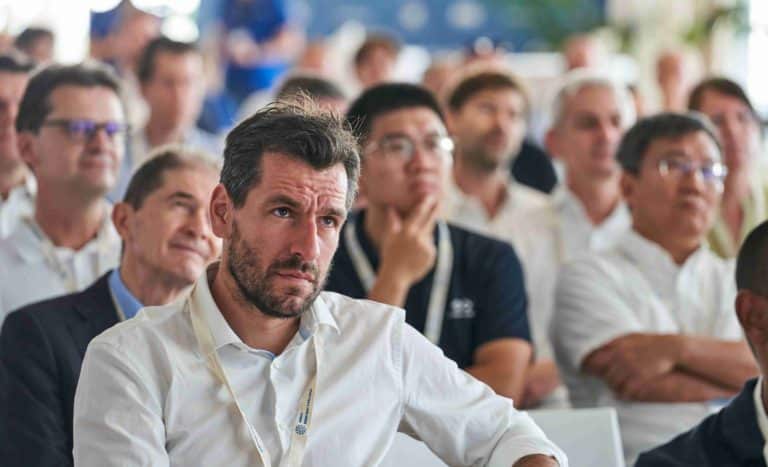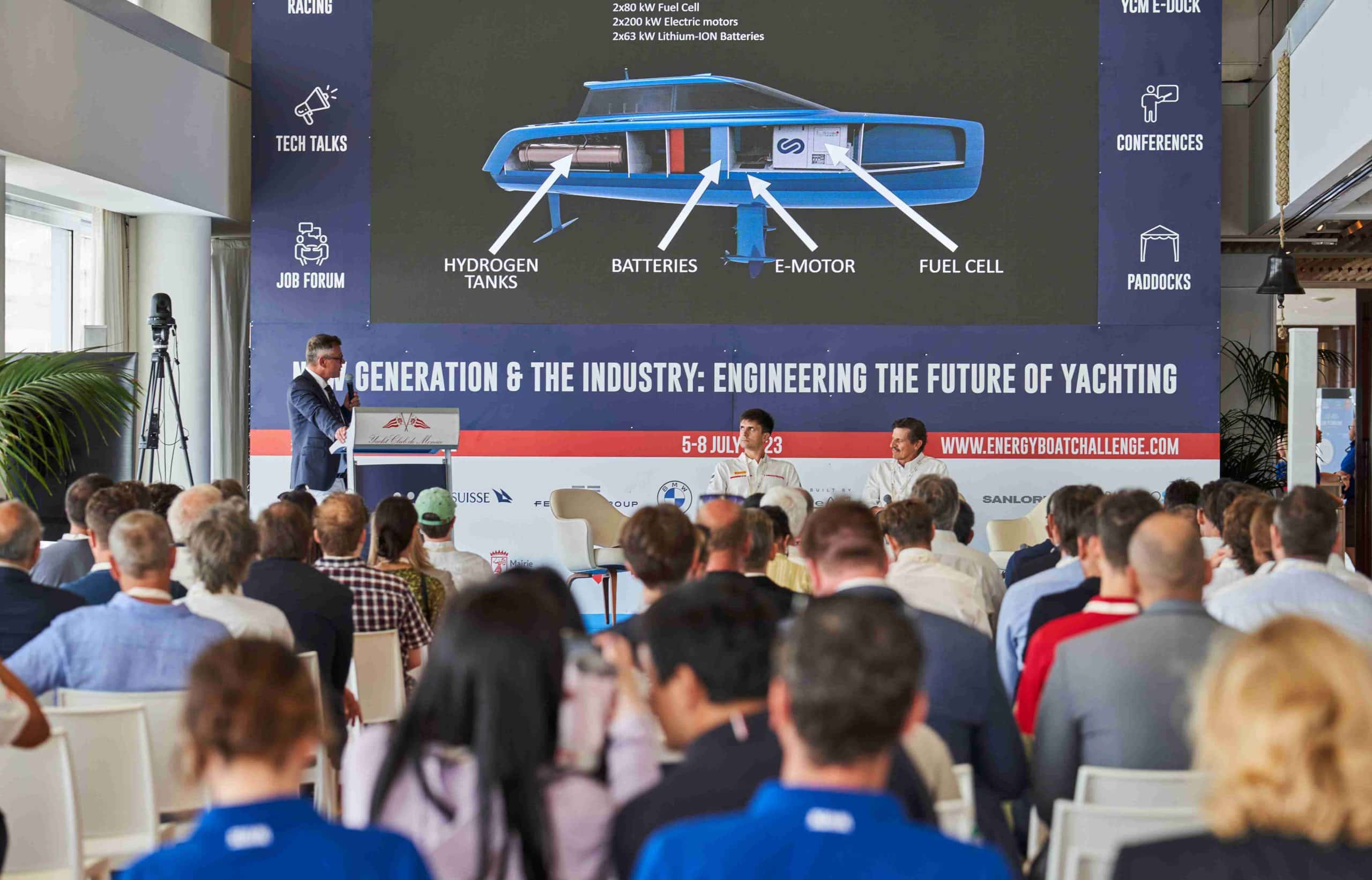Thursday 6th July 2023. The theme of the conference on Thursday 6th July at the Monaco Energy Boat Challenge was the ‘Sustainability Transition: Challenges, Engagement, Adoption’. Although issues relating to new solutions and green energies were the focus, panellists also analysed the impact of the whole ecosystem from R&D to design, development and building of boats, be they offshore race yachts, motorboats, pleasure craft or superyachts. A broad overview but with conclusions essential to the sector segments concerned.

The first conclusion, highlighted by the Blue Game team and Umberto de Luca, Project Manager Luna Rossa – Prada Pirelli, who are developing 50-knot-speed hydrogen chase boats to meet America’s Cup specifications, is that the complexity of these cutting-edge boats involves a host of partners: suppliers, engineers and researchers in a range of fields working upstream and throughout the design chain rather than downstream. As Jeff Butler, editor-in-chief of Plugboats.com, electric boats specialist, reminded the audience, any boat is as much about the interactions between different trades as it is between complex systems that must work well together and be as automated as possible. The days of a simple combustion engine where it was enough to increase horsepower or fuel to go faster or further are over.
The second conclusion is that efficiency is key and that the angle taken must be partially reversed to ensure the approach and engineering are holistic. As Rodi Basso, CEO of the E1 Electric Powerboat Championship, also involved in Formula E, pointed out: “Monaco Energy Boat Challenge engineers have a bright future ahead of them”, while Luca Santella, Head of Product Strategy at Blue Game believes they are the ones who “with their passion, energy and concern about the environment” will accelerate the pace of change.
Which leads on to the third conclusion recognised by Nino Ascone, Head of Engineering and Design FSD for the Ferretti group. For despite recent progress and a strong determination to be more proactive; and despite involvement of so many shipyards, the leisure boat industry remains rather conservative, working with an eye to the long-term. For example, the first foiling electric boat prototype was presented by Jérémie Lagarrigue, CEO of EODev, at Yacht Club de Monaco in 2014, while the Candela C8 that today embodies mass production of this technology only joined the Monaco Energy Boat Challenge in 2023, ten years later. The effectiveness of foils and battery efficiency among other advantages are promising foundation blocks for the future of the least-carbon-content possible for yachting but how long does it take to go from R&D to production!

s Charles Dence from Spark Marine Projects points out, adoption of new sustainable solutions “is also a matter of costs in relation to the benefits, which are better borne by mass production industries like automotive and aerospace”, or Michel Marie, Life Cycle Analysis expert at Marine Shift 360, who says “we will come via shipping”. In this sense, notes Adrien Thoumazeau from Lateral Naval Engineering, “the validation curve for technologies maturity and their adoption clearly shows that some solutions such as hydrogen are still only at the beginning even though technically they are already available and efficient. There is also the notion of risk mitigation to be taken into account, not just the technological risk but also the economic risk and associated added value”.
Finding the right compromise and timing between development, technology maturity, getting it onto the market and adoption is not easy, especially as regulatory or political issues sometimes interfere. But this is where competition has a role to play. Whether it requires imposing sustainability into the specifications, as with the IMOCAs, or using these playgrounds to force use of new solutions, in the same way foils have become essential, competition is no longer a laboratory. Imogen Dinham-Price, Head of Sustainability for the IMOCA class showed how integration of an ACV in the Class rules is a constraint experienced in a positive way as it defines performance indices and makes it possible to lower carbon impact based on objective analyses thanks to a tool developed by Marine Shift 360.
There are parallels with other sectors, where again the automobile industry is a focus for concern, in particular Formula 1. But as Alex Bamberg, CEO of Aqua superPower, points out the story of Tesla is emblematic, as its success when faced with infrastructure limitations and industrial and regulatory constraints was part of an often long tedious process without being insurmountable. Although it may seem “too long, it’s not, given our home is burning and June 2023 was the hottest on record in the planet’s history!”
Enrico Benco, who developed a recyclable composite material for the Permare / Amer Yachts group agrees but remains positive: “It’s true, we have to move from simulation in R&D to prototypes and validation again and again, then validation in practice in a marine application, very restrictive in an aggressive salty environment, then certification; only then can we plan production and industrialisation on condition of course that owners agree to be pioneers and to pay the extra cost incurred by long years of development. But we’re getting there!”
The last word goes to Jarkko Jamsen, naval architect at the head of the Navia studio and an engineer passionate about technology who works on large and small projects. While he insists that it is “technically, mathematically not possible to have a 50m+ all-electric yacht, our job is to explore all the possibilities, to combine solutions, experiment with alternatives and offer them to the market, because we are lucky to be part of a universe where there will always be customers willing to be pioneers if we can show them that it works!”